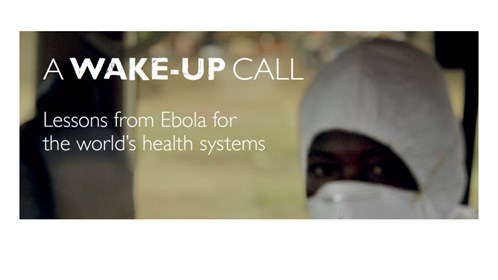
By Rosalind McCollum
Last week, Save the Children launched ‘A wake up call’, drawing lessons from the Ebola Virus Disease epidemic for health systems strengthening on a global scale.
One of the key messages of this report is that Guinea, Liberia and Sierra Leone are not unique in their vulnerability to Ebola. Save the Children identify 28 countries with health systems as fragile as, or weaker than Liberia’s, emphasising that weakened health systems which contributed to the extent of the current outbreak are not a one off. There is widespread need for drastic health systems strengthening and resilience building on a global level. Guinea, Liberia and Sierra Leone’s under-resourced, under-funded and poorly equipped health systems were quickly overwhelmed by Ebola. The case for universal health coverage (UHC) has never been stronger.
Comparing rankings on health access in Sierra Leone and Kenya left me feeling shocked!
Having worked in Sierra Leone both before and during the Ebola crisis and now living in Kenya I decided to compare their rankings in the report’s health access index. I was shocked to discover that Kenya ranks lower (47/72) than Sierra Leone (46/72) for health access. How could this be the case? Kenya has a gross domestic product (GDP) of $1245.50 per capita, while Sierra Leone’s is just $679 per capita, meanwhile Kenya has 9.7 doctors, nurses and midwives per 10,000 population compared with 1.9 per 10,000 population in Sierra Leone. Yet there is remarkably little difference in per capita government expenditure on health, with $15.9 per capita in Sierra Leone and $17.0 in Kenya. Both skilled birth attendant and immunisation rates are higher in Sierra Leone than Kenya. Not only this, but the ratio between the richest and poorest for skilled birth attendant at birth shows remarkable differences, with a ratio of 1.6 in Sierra Leone and 4.0 in Kenya. Perhaps their rankings are not as outlandish as I had first considered?
Equity gaps persist
Sierra Leone has slowly been recovering from the aftermath of its civil war with recent recognition of the need for universal health coverage and initial steps taken towards investing in primary health care through introduction of the free health care initiative in 2010. This resulted in free health care for all pregnant and lactating women and children under five years, prior to the onset of the Ebola outbreak. Kenya too describes the need for equity and access to health care for the whole population within its policies and yet drastic equity gaps persist. As a signatory to the 2001 Abuja declaration Kenya has committed to allocate at least 15% of national GDP to health care, yet allocation has remained below 5%, with secondary and tertiary facilities historically allocated 70% of the budget. However, Kenya has increased its investment in primary health care and per capita outpatient visits are thought to have almost doubled in the 2003 – 2013 period based on household healthcare utilisation and expenditure data (2013). Free maternity was introduced in all public health facilities in 2013 to address challenges with access to skilled deliveries but it has also suffered from challenges with the health system. There has also been renewed interest in community health services.
Devolution in Kenya brings opportunities for equity
As recently highlighted by RESYST researchers, Kenya is undergoing meaningful change through devolution, which is driven from the public rather than the centre. Responsibility for health coordination and management of healthcare now lies at county level. The introduction of equalization funds for marginalised counties demonstrates commitment to reducing inequalities between counties. County decision makers have the opportunity to identify context specific health priorities, giving them the freedom to provide more context appropriate and equitable services, thereby allowing them to increase health coverage and build a more resilient health system. Not only this, but there is potentially greater opportunity for collaboration with other ministries at county level, enabling not only provision of health services but engagement and empowerment of communities in tacking underlying social determinants. In light of Ebola’s impact in Guinea, Liberia and Sierra Leone there is a need to explore and understand priority setting processes within counties following devolution in Kenya, to measure and track equity indicators and health coverage and to understand strategies for strengthening the six WHO components for health systems at county level, as highlighted in ‘A wake up call’ report.
Recent news
- International Women’s Day 2015: Celebrating women’s role in the promotion of primary healthcare in Ethiopia, 8 March 2015
- Experiência como primeiro autor de um artigo – Lições aprendidas e desafios, 14 January 2015
- What I learned through the process of being a first author on a REACHOUT paper, 9 January 2015

This project is funded by the European Union.
